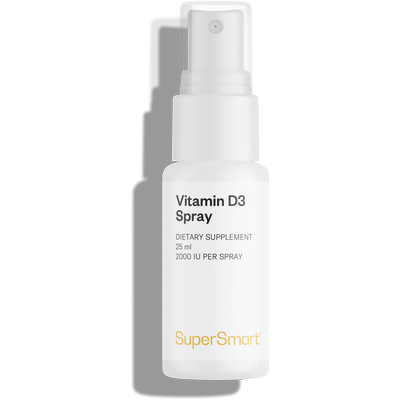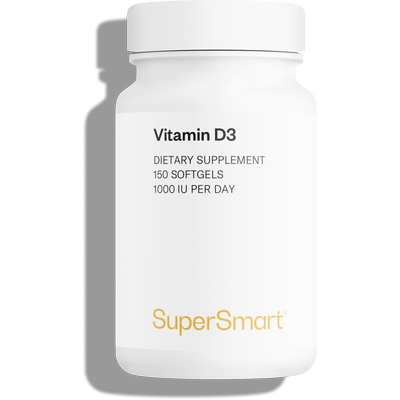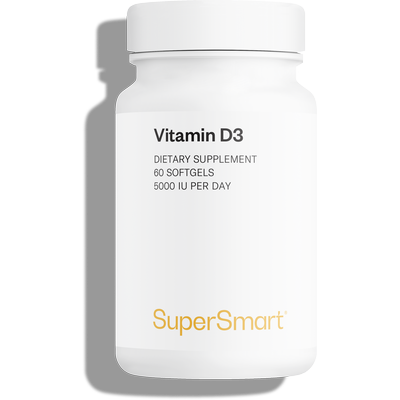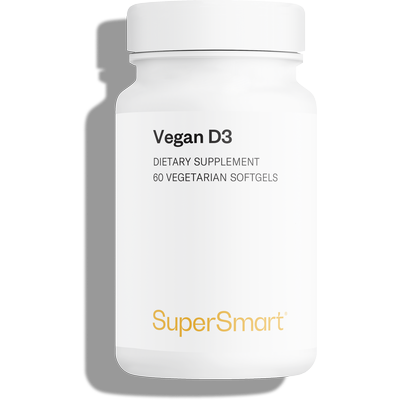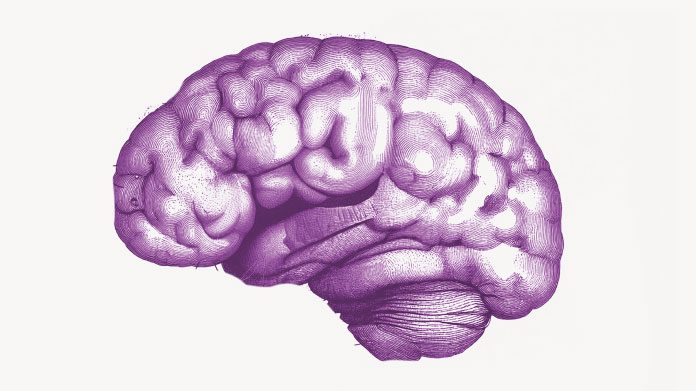Does vitamin D help prevent dementia?
A 35-year study, published in December 2022, analysed the relationship between vitamin D levels and cognitive decline in older adults. We take a closer look at a discovery that pushes the boundaries in the fight against Alzheimer’s disease.

Vitamin D cognitive function: what we know
While the benefits of vitamin D on bone strength, immunity and general well-being have been well-documented for many years, its effects on the brain have been explored less extensively (1).
However, a 2012 meta-analysis found a correlation between low vitamin D and reduced cognitive function as well as a greater risk of developing Alzheimer’s disease (2).
A 2016 study reached a similar conclusion, stating that “it appears crucial to maintain vitamin D concentrations at sufficiently high levels in order to slow, prevent, or improve neurocognitive decline“ (3).
Most importantly, a new article was published in December 2022 on a long-term study demonstrating the benefits of vitamin D in a population of elderly volunteers (4).
Almost 300 individuals had agreed to undergo yearly tests designed to assess their mental health and cognitive function, over a period that for some, extended to 35 years! All the participants had agreed to donate their brains to science after their death.
This three-decade, large-scale investigation identified an association between higher vitamin D concentrations in all four areas of the brain and a lower risk of developing dementia or cognitive impairment by the time of the participant’s final test before their death.
In other words, the vitamin appears to protect cognitive function in older individuals, and by extension, the population as a whole.
Link between a lack of vitamin D and dementia: mechanisms yet to be established
A number of studies over the last ten years or so have thus demonstrated a correlation between vitamin D levels in the body (or even the brain) and cognitive function and mental health.
A 2013 paper summarised the situation as follows: “Beyond its traditionally-recognised properties of regulating calcium phosphate metabolism, vitamin D is a neurosteroid hormone essential for neurophysiological function (regulation of neurotransmitters and neurotrophins) with an additional anti-inflammatory and antioxidant neuroprotective action” (5).
What’s more, it was found that older people with dementia or Alzheimer’s disease or with decreased cognitive ability, all presented with a deficiency in vitamin D while conversely, those with good cognitive function had adequate vitamin D levels.
As yet, however, the specific mechanism by which vitamin D protects the brain from decline is unknown. Further research is therefore needed to establish exactly how vitamin D acts to protect against dementia and Alzheimer’s disease.
How can you boost your vitamin D levels naturally?
The body obtains vitamin D in two ways: from food, especially oily fish and eggs, and from exposure to the sun. Vitamin D is naturally produced by the body when the skin is exposed to UVB rays.
But as one dermatology study noted (6), “the recommended daily dose of vitamin D for adults (at least 800 IU) cannot be achieved through diet alone”. What’s more, above a certain level of exposure, UV leads to the degradation of vitamin D and its precursors in the skin. In addition, it’s been widely demonstrated that UV radiation is the main external risk factor for skin cancer.
Therefore, in order to obtain a minimum of 800IU of vitamin D a day, and if possible an adequate dose of 2000IU-5000 IU, many doctors follow the example of France’s National Academy of Medicine (7) in recommending routine supplementation with vitamin D for the whole population.
SUPERSMART ADVICE
References
- ALI, Nurshad. Role of vitamin D in preventing of COVID-19 infection, progression and severity. Journal of infection and public health, 2020, vol. 13, no 10, p. 1373-1380.
- BALION, Cynthia, GRIFFITH, Lauren E., STRIFLER, Lisa, et al.Vitamin D, cognition, and dementia: a systematic review and meta-analysis. Neurology, 2012, vol. 79, no 13, p. 1397-1405.
- ANNWEILER, Cédric. Vitamin D in dementia prevention. Annals of the New York Academy of Sciences, 2016, vol. 1367, no 1, p. 57-63.
- SHEA, M. Kyla, BARGER, Kathryn, DAWSON‐HUGHES, Bess, et al.Brain vitamin D forms, cognitive decline, and neuropathology in community‐dwelling older adults. Alzheimer's & Dementia, 2022.
- ANNWEILER, Cédric. Les effets neurocognitifs de la vitamine D chez la personne âgée. OCL, 2014, vol. 21, no 3, p. D307.
- BARYSCH, Marjam-Jeanette, FELDMEYER, Laurence, BISCHOFF-FERRARI, Heike, et al.Vitamine D, ultraviolets et cancer de la peau. Revue médicale suisse, 2010, vol. 6, no 246, p. 884-885.
- Rapport de l’Académie nationale de médecine. Statut vitaminique, rôle extra osseux et besoins quotidiens en vitamine D. Bull Acad Natle Med. 2012, 196, 1011.
Keywords
5 Hours
Just OK
Just OK, ordering from company for many years and being safisfied
Lynn Mae
18 Hours
Recomendo
Produtos encomendados são recebidos atempadamente e de acordo com o anunciado! Muito satisfeita!
Carla Sofia
1 Days
Everything is great!
Everything is great!
Jonas
6 Days
The delivery was fast and the product…
The delivery was fast and the product is great
SOMMARIVA Gianni
7 Days
Great service and lots of information
Great service and lots of information
Gabi
10 Days
Service Satisfaction
I’m satisfied with the service; it fulfilled what it set out to do.
Anfhony Abreu
13 Days
Original product and fast delivery
Original product and fast delivery. I haven't started it yet, but will do soon.
Vincenza Catania
16 Days
Good quality
Good quality. Good service.
Leonel Guzman
18 Days
Top!!!!!!!!
Top!!!!!!!!
Michael
20 Days
Excellent!
Products are great and delivered fast!
PARDINI Debora
20 Days
From order to receive the product
From order to receive the product, the process is smooth & fast. It’s good to customers.
WONG Mei Ling
21 Days
Fast delivery
very quick delivery to italy. product is good.
Customer
22 Days
Prompt delivry !!👍
Prompt delivry !!👍
SWEET Christine
23 Days
Good delivery and flawless quality
AS far as delivery and the visual quality are concerned, Supersmart is excellent. I will not comment on the efficacy of the products themselves, since that is only possible over a longer period and in a large customer base compared to people who do not consume a particular product.
Roger De Backer
24 Days
Perfect services
Perfect services, perfect support, great articles about products
Michaela Alali Beitlová
of experience
your money back
##montant## purchase


